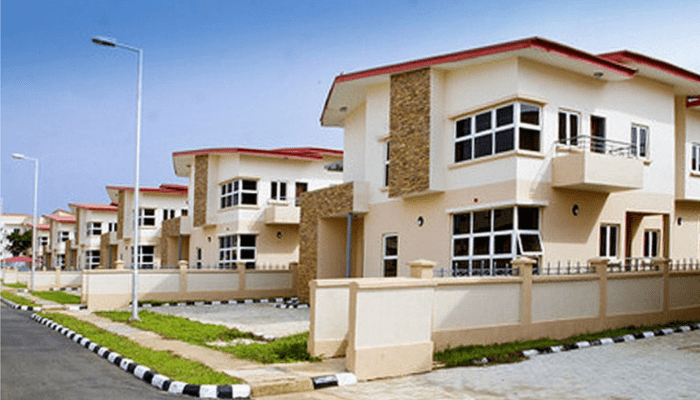Extortion, discrimination reign as demands for affordable housing soar
Cynthia Edeh desperately needed a one-bedroom apartment close to her workplace in Wuse. She thought her ₦1.5 million savings would comfortably settle the bill. She goofed!
After weeks of fruitless searching, multiple bribes and discrimination, she was face-to-face with the stark reality. It became clear finding affordable housing in Abuja is no small feat.
Frustrated, she lamented: “It is shocking that even N1.5 million cannot get one a good one bedroom apartment in Abuja anywhere close to the city centre. God help us. Honestly, it is really discouraging. Abuja landlords and developers are not trying at all.
“How can they justify charging N3 million for a one-bedroom apartment? It is modern day slavery, you work just to pay rent. I feel agents and lawyers are the main issue. They deliberately inflate prices because the higher the rent the higher the fee in the percentage they would get.”
To get decent affordable housing in the nation’s capital at the moment can be likened to a camel passing the needle’s eye. Accommodations are so expensive and often times the conditions of the houses do not match their prices.
A self-contain apartment that used to cost between N300,000 and N500,000 per annum in areas such as Lugbe, Kubwa, Lokogoma, Galadimawa and the Apo axis now goes for between N800,000 and N1.5 million. One-bedroom apartments are priced between N1.8 million and N2.5 million, while two-bedroom apartments range from N2.5 million to N4 million.
In areas like Life Camp, Gwarinpa, Jahi and Wuye, a self-contained apartment costs between N1.5 million and N3 million per annum. A one-bedroom apartment is priced between N2 million and N5 million, while two-bedroom apartments range from N3.5 million to N8 million, depending on the location and property.
In Wuse, Maitama, Asokoro, Guzape districts, as well as other highbrow areas, rents can go as high as N5 million for a self-contained apartment, N10 million to N15 million for a one-bedroom apartment, and up to N20 million for a two-bedroom apartment per annum.
Aside the rising cost, growing demand for housing, combined with limited supply, have also given rise to discrimination and extortion in the city’s housing sector. It has created an environment where unscrupulous landlords and middlemen exploit vulnerable individuals, often demanding excessive rents, bribes and discriminatory practices in tenant selection.
Discrimination is prevalent in various forms, including bias based on ethnicity, religion, or financial status. Many potential tenants find themselves being denied housing opportunities simply because they do not meet certain prejudiced criteria.

For instance, landlords may reject applicants based on their marital status, ethnic or religious backgrounds, or profession or impose higher rents on specific groups to discourage them from wanting the house.
Extortion has also become the order of the day. Some landlords or agents demand extra payments under the guise of “admin fees”, “security deposits,” “Know Your Client Form”, beyond the standard requirements, or even ask for bribes to secure tenancy.
This is often in addition to huge fees generally imposed on tenants as agent fees, lawyer fees, caution fees, services charge among other charges. When combined, these fees can nearly double the initial rent the prospective tenant is expected to pay. Furthermore, house seekers are often required to pay outrageous fees for every property they inspect, regardless of whether they are interested in the property or not.
There have also been cases of agents advertising non-existent houses to lure house seekers, collect inspection fees, or, in some instances, collect rent from multiple individuals before disappearing.
This situation has made it difficult for many Abuja residents, especially low- and middle-income earners, to secure decent and affordable housing.
As a result, some individuals and families are forced to live in overcrowded or substandard conditions, while others are pushed to the outskirts. Even these areas too are witnessing a surge in cost of house rent due to a rise in demand.

Sunday Ikechukwu recalled: “After so many months of searching and wasting so much money on inspection fees. I eventually found a house in Pyakasa, only for them to tell me they want a civil servant. The house is still sitting there empty. I wonder if the money of a civil servant smells differently. I have also seen a couple of listings that clearly stated they don’t want a lawyer as tenant. One agent told me to pay N50,000 so that he can help talk to the property management to accept me. What madness is going on in Abuja?”
Itohan blaq: “My house hunting journey in Abuja has been quite exhausting. I have been actively hunting for 10 months now.
“I mean gone are the days when one would see ‘House to Let’ written at the gate of any vacant accommodation and you could simply walk in to inspect and contact the landlord directly, thereby eliminating 20 per cent agency and legal fees.
“And because of this same ‘20 percent,’ you’ll find that these agents would advice the landlords to increase the cost of the apartment so that they (agent) would in turn get a good chunk of the tenant’s hard earned money.
“There is no more affordable accommodation in Abuja to be very honest. And, weirdly, some of these landlords would say they prefer a single working class person or a civil servant to rent their space. How would a single working-class person afford a one bedroom of N2 million?”
“To be honest, there are lots of issues when it comes to securing accommodation that one can afford with the kind of pay check we get these days. Price of everything is constantly on the rise, everything except salaries in Nigeria.
“There should be a way to regulate these things. Government can help put a cap on the agent fees. Three to five per cent is a good deal as against 20 per cent. The world has become too advanced to rely solely on agents to take us to vacant apartments. We can leverage on enlisting vacant accommodations on sites where interested people can get to see them and reach out directly to the owners or their lawyers. Although one has to be careful with these sites to avoid getting scammed.”
Hafsat Ibrahim relocated to Abuja in 2023: “I moved to Abuja because I wanted a change of environment and to grow my career. A friend who needed a roommate offered me a place in her two-bedroom apartment.
“The rent was above my budget, but I managed to pay. When the rent expired, the landlord said he wanted to renovate and increased the rent. Since then, I’ve been searching for a house.”
Stranded, she returned to her father’s house in another state while searching through agents and friends: “Some places agents took me to were so bad that even pigs couldn’t live there. Yet, I still paid agent fees of ₦10,000 to ₦15,000.
“Agents often lied about the condition and price of houses just to get me to inspect. I’ve spent almost half of the money I saved for rent on inspection fees and transport, yet, I haven’t found a good place.”
Chief Executive Officer, Gidi Steel Estate Management, Gideon Paul, stated: “The real estate market is a complex ecosystem. It involves landlords, property managers, caretakers, lawyers and agents. As in every system, there are good and bad actors.
“When it comes to the rising cost of housing, the reasons vary. Some houses are expensive due to landlords, while others are costly because of agents. For instance, I’ve encountered cases where a landlord sets a specific price for a property, but an agent advises them to increase it, promising to find a tenant willing to pay more.
“This is often motivated by the agent’s desire to earn higher commission fees. Some agents also impose additional charges that were not part of the landlord’s terms, especially when they manage the property.
“On the other hand, some landlords independently set high prices. In fact, many landlords are pleased when tenants vacate their properties because it gives them an opportunity to raise the rent.
“Another major factor contributing to the hike in rental prices is Nigeria’s economy, particularly the high inflation rate. As the cost of living rises, people with assets like real estate tend to increase their prices to generate more income. Unfortunately, in Nigeria, many property owners do not necessarily add value to their properties before raising the rent—they simply increase the price.”
To address these challenges: “We are working to influence pricing by providing landlords with valuable insights on how to earn income from their properties without hiking rental prices. Many landlords lack access to real estate knowledge, including how to expand their portfolios and maximize opportunities in the market.
“We’re also developing an app to regulate the activities of various parties involved in real estate transactions, including unscrupulous agents. The goal is to create balance and ensure transparency in the market.
“Additionally, we have established discussion groups where house seekers share experiences and gain insights on navigating the rental market. These initiatives empower them to approach the process with greater awareness and confidence, avoiding common pitfalls.
“There are more initiatives in the pipeline, which we’ll unveil in due time. We are committed to improving the real estate sector and making it more accessible and fair for everyone.”
A lawyer, Idris Amoo, said: “The cost of housing in Abuja is extremely high and poses a serious challenge. This issue has persisted for a long time. It appears that the Federal Capital Territory Administration (FCTA) has not adequately addressed the housing deficit relative to the growing population.
“Exploitation by house agents is another critical issue. These agents have become a menace to society and the environment. They often create artificial inflation, significantly increasing property values and insisting on high commissions.
“To tackle this, government could consider enacting legislation or regulations requiring property owners to advertise and lease their properties directly to prospective tenants. This would eliminate the middlemen, who are often responsible for driving up rental prices.
“Another approach would be for government to license and register all agents operating within the FCT. A comprehensive database of agents could be created to ensure accountability. Any agent found exploiting tenants or property owners could be reported and appropriately sanctioned.
“Currently, many agents operate without oversight or proper identification, enabling them to exploit and swindle unsuspecting tenants and even property owners. Implementing a licensing and monitoring system would help curb such practices and bring more transparency to the housing market.”
Idris also advised the government to key into mass housing projects to provide affordable h accommodation for residents.
An engineer, Abdulahi Hashim, acknowledged noted that houses are often overpriced. He called on the Federal Competition and Consumer Protection Commission (FCCPC) to step in and regulate the sector.
Source: Thesun



